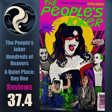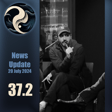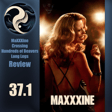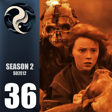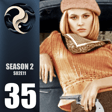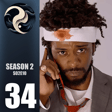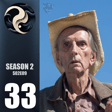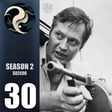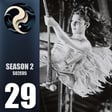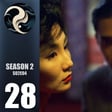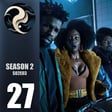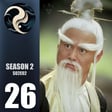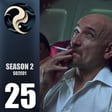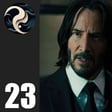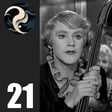Become a Creator today!Start creating today - Share your story with the world!
Start for free
00:00:00
00:00:01

Episode 031 - Queer Cinema Picture Show
Joined by our special guest Cesar, we explore Queer Cinema highlighting some of our favourites of the genre while going through its history
Intro clip from Stephan Elliot's "The Adventures of Priscilla, Queen of the Desert" from PolyGram Filmed Entertainment and Specific Films, distributed by Roadshow Film Distributors
Opening music: https://pixabay.com/music/id-116199/
Closing music: https://pixabay.com/music/id-11176/
Outro Easter Egg from Jermaine Clement's television series What We Do in the Shadows featuring Matt Berry
Two Oceans is a creation of Siouxfire & Scrumpy in association with SiouxWIRE
Recommended
Transcript
Setting the Scene with Music
00:00:00
Speaker
I want to break free! I want to break free! Two oceans. Two oceans will begin. I need to speak to Caesar! Well, look what the cat dragged in.
00:00:30
Speaker
What have we got here, eh? A couple of showgirls, have we? Where did you ladies come in from? Uranus? Could I please have a stop? No! You can't have, you can't have nothing. We've got nothing here for people like you. Nothing! Now listen here, you mullet.
00:00:55
Speaker
Why don't you just light your tampon and blow your box apart? Because it's the only bang you're ever gonna get, sweetheart.
Introduction to Queer Cinema for Pride Month
00:01:12
Speaker
Welcome to the Tuishins Podcast. For myself, Sufire, along with my friend and ravishing colleague, Scrumby, discuss film and other media through a decades-long lens of mass media consumption. In this episode, we'll be celebrating Pride Month by looking at the history of queer cinema and some of our favorites of the genre, along with our special guest, Caesar. This is the Tuishins Podcast.
00:01:35
Speaker
So throw on that Angora sweater and doll yourself up for Episode 7, Series 2. So here we are, Episode 7. Look at queer cinema. And I suppose where we've asked, you know, what is queer cinema? Just to be clear, it's not a specific category. It's a level above Asian or Black cinema that we've looked at previously, and it consists of all genres.
What Defines Queer Cinema?
00:02:02
Speaker
And that said, Simon Callow in a book that I've been reading by Stephen Paul Davies called Out of the Movies, he mentions that there's two groups of films in his mind, those of a specifically kind of gay sensibility and those of which attempt to depict gays as part of the general human situation.
00:02:21
Speaker
But then overall, thinking about it, I wonder, is it helpful to even categorize films as queer, similar to that scene in Jeffrey Wright's Thelonious Ellison character in American fiction, where he's frustrated that he's having all his books being put into the African-American studies section.
Personal Narratives in Queer Cinema
00:02:41
Speaker
We got a lot of ground to cover today. There's a lot of stuff we're kicking off with an icebreaker in terms of our first introductions to queer cinema. Indeed. And I think they all overlap to a certain degree because I looked at the notes that both of you have put down and I was like, oh, yeah, I forgot about that.
00:03:01
Speaker
Right. Yes, some of that. So yeah, mine early on very growing up in a very religious conservative household as well. So there was this very specific lens that seemed to be the dominant media lens, at least as far as what we were able to consume for growing up. So, you know, to me, gay men, you know, in terms of on screen is something like the level Liberace or Paul Lind, you know,
00:03:26
Speaker
very, very gregarious, very hilarious, entertaining, something like that. They have some worth or some value tied to that, unfortunately.
Drag Comedy and British Cultural Context
00:03:38
Speaker
Other than that, so there was that level or, and it was never seen as a gay sort of thing at the time. It was just with drag comedy, a lot of like with Monty Python. They just couldn't get female performers, so they just,
00:03:52
Speaker
So they just did it. They just took it over themselves, right? Being men, of course. They just said, well, we can just play women. That's right. I mean, England has a long history of that, obviously. Hundreds of men. But in most cases, they're just playing it as they're just in dress up playing women. It's not
00:04:13
Speaker
queer or gay or whatever, right? It's just- Yeah, it's not Eddie Izzard or something there. That's right. Exactly. I'm a woman. Yeah. It's Flip Wilson being an outrageous woman, just your Milton Berle being an outrageous woman. Oh, isn't it funny there in wearing the other person's clothes? But on that, because you're sort of talking about the British side, I remember one of the earliest things was the Pronsky Beat video for Small Town in 1984. That's obviously British.
00:04:43
Speaker
Then you had movies like My Beautiful Laundrette with Daniel Day-Lewis. I think there wasn't a perception to Americans that the British accent was somehow queer as well. Yes, dandy. Well, yeah, it sounds fruity. There's my dad impersonation for you. You're welcome.
00:05:04
Speaker
He loved Fruity, that's his description for it. That's what I grew up with. So just to explain the context of the prejudice that I'm trying to work against. Sure. Sure. Or through or out of or whatever.
Unintentional Queer Themes in Horror
00:05:16
Speaker
The main one for me as a kid was Nightmare on Elm Street 2, which again, which I still find hilarious that the screenwriter swears up and down. It's not, he didn't write a gay movie.
00:05:28
Speaker
It just kind of came out that way. I'm like, sure. Okay. If you say so. But you know, the, the, the screen queen is male. Mark Panton has a great screen as well. But I mean, you know, the, the gym teacher thing, picking them up in the bar, the way the gym teacher gets killed, like,
00:05:44
Speaker
there's all even the kills are tied to it and this thing about coming out and coming through and then even his little dance number in it it's like oh man that's super gay like you know he's like everybody but they you know there was no way to pitch it is that but they just seem like they just kind of did it and even though the majority of folks working on it seemed to be straight except for the lead actor sure that they kind of
00:06:09
Speaker
happened on it or something like despite their own clumsy, you know, again, white men failing upwards, you know, just kind of stumbled into this like, oh, we made this iconic thing we didn't even know. Like, well, you know, cinema is cinema and the best films are personal to its creators, right? Whether or not it's intentional or not.
00:06:27
Speaker
Regardless of whether it's from the perspective of a different culture or background, it doesn't really matter, which is why I think the classifications don't always help.
00:06:44
Speaker
I think, go ahead, sorry. Oh, I was just going to say, did we introduce you, Caesar, while we've been recording? Because I was going to say, to help us on our journey tonight, as we go through a whirlwind tour of LGBTQ cinema, we're joined by Caesar, who will be offering a more personal perspective. Hello, everyone. Hello, listeners. It's very nice to be here with you to talk about this important topic, as all topics on this podcast are.
00:07:15
Speaker
Well, we are obviously coming from a point of a certain amount of ignorance that we can't help. Mine's a high level of ignorance. Mine's very high. I am very appreciative that you're here and you'll be able to take the time. No, it was great, especially since we had our conversation a few weeks ago. It's been sort of rolling around in my head.
00:07:36
Speaker
I think to your point about the Nightmare on Elm Street Part 2, even if the writers didn't intend it to be gay, I think one of the great things about art, and as we're talking about cinema and television, once it's created, it's up to everyone who watches it to sort of interpret what you're seeing.
Impact of Critics and Film Availability in the 1980s
00:07:56
Speaker
And I agree with you that I think it's very
00:08:00
Speaker
I mean, even if it wasn't coded and like you didn't intend it to be, in our modern view, we see all the little signs, which is probably what was allowed at the time. Right. Yeah. Very true. Yeah. And then I suppose the other other films for me would be, I mean, the big thing is, you know, Siskel and Ebert at the movies. And it's one of the things that Nolan used to talk about all the time.
00:08:28
Speaker
that I was introduced to a lot of films like My Beautiful Laundrette through Siskel and Ebert because I trusted the reviews, the movies that I'd seen that they recommended were very good. And, you know, they included queer content as part of that. And, you know, I ended up going to see it because I was a cinephile even back then. And then you had things like Rocky Horror Picture Show being around at that point.
00:08:56
Speaker
John Waters output, you know, polyester, pink flamingos and all that other good stuff. And then you had things that, like personal best, I remember with Mariel Hemingway way back in 1982, just as puberty things were happening, you know.
00:09:14
Speaker
And then I remember in school, in grade school, Kirsty McCall and Jodie Foster at the time were two of the kind of bigger, younger actors of the time. When you say Kirsty McCall. Yeah. Yeah. Kirsty McCall. Sorry. Sorry. Not the Irish singer.
00:09:35
Speaker
No, no, no, not that. Right. And then the items that you brought up, Caesar, they I looked at those and I was like, Oh, gosh, yeah. Yeah. Well, it's the time, right? You know, I'm just a few years older than both of you. And so I just remember the hubbub of Billy Crystal and, you know, the
00:09:57
Speaker
soap and it's going to be a gay character. And of course, um, he really was just sort of the punchline most of the time, although he was in several seasons, I think, but it was just a big deal. And then the move, the movie making love where they had to, there was a disclaimer at the beginning of the movie. They explained, yes, this is a movie. It's, you know, homosexual and it's real and we want you to watch it. And I thought, okay.
00:10:26
Speaker
There's no coding here. You're telling me right up front, this is what we're going to see. Now, of course, you know, there was no overt sex, you know, there's men in bed together and things, but it was still pretty shocking. And then the first, the first movie that I personally rented at a video store, that was a gay movie was Torchhawk trilogy. And, you know, and
00:10:50
Speaker
adorable, very young, Matthew Brederick in one of the segments. And, you know, obviously, Harvey being his amazing, gravely voiced, you know, self, and Bancroft, his mother at the third segment.
00:11:07
Speaker
You know, I just thought, here's a guy and he's just living his life, uh, tragedy and whatever, but it's just so, it's a memorable thing to me. I just remember having that tape and watching it, you know, getting it, writting it out a few times. It was great. So those are all certain, but I agree with all of the other selections. I mean, my beautiful Andrett was one of the first, uh, which go art art movies, you know, whatever, uh, that movie would look like in Lubbock, Texas in 1986.
00:11:37
Speaker
Um, you know, there was one sort of art, uh, theater movie theater that, you know, they would show some of these things out. And that was one of the first movies I saw in that. And I was just shocked. Were you actually in Texas at the time? Love bike, Texas, sculptural, maybe over the free world. Anybody? Wow. Yeah. I went to, I went to Texas.
00:11:58
Speaker
Great. Well, we're kind of sticking to our schedule here. So the first section where we're going through the history of career cinema, first bit being the pre-Hays Code.
Queer Films Before and During the Hays Code
00:12:09
Speaker
So basically anything prior to 1934 where it was no hold sparred.
00:12:15
Speaker
And this is, you know, I've been familiar with movies like Pandora's box with Louise Brooks, Wings, Machen and Uniform. But one that I never heard of was different from the others, which was a film by Richard Oswald in 1919 that had pretty much been lost because the wrong people got ahold of it. We're trying to destroy it, but fragments still exist.
00:12:40
Speaker
That was an entirely gay story about two men in love. There are only bits and pieces. I don't know if you're familiar with it. By the way, Cesar, if I'm taking this off the research I did, and if I shouldn't be on the steering wheel, you grab it. Yeah, no, no. I had not turned it differently than the others.
00:13:01
Speaker
I think the thing I would like to say about the movie's pre-Hays Code were really, yes there were no holes for art, but essentially if there was a queer character on it.
00:13:12
Speaker
on the screen, it was a light hearted, yeah, the sister characters I added there, it was a quote I heard from Quinton Crisp, or names that, you know, the sort of flamboyant, limp-rusted, maybe has makeup on sort of characters who are there to lighten the mood and sort of present a positive spin, although, you know, they're just being clownish, but
00:13:40
Speaker
The quote he said was, when a man dresses like a woman, everyone laughs. When a woman dresses like a man, no one laughs. They just think she looks wonderful. And so Sissy Carrington was a term he came up with for that time frame of the kind of character that was being shown previous. Well, this is the thing with different from the others that's so extraordinary is it's a sympathetic drama
00:14:08
Speaker
about this couple, and it's not played for laughs. It's about a loving couple, which is probably why it ended up getting mostly- It didn't survive a purge at some point. But the fact that it was in 1919 as well.
00:14:25
Speaker
Yeah. There were gay people then? Don't start. And then we've got the Hays Code era where there was an explicit ban for what they termed as sexual perversion during the time.
00:14:41
Speaker
mostly being used as a euphemism for homosexuality. So any sort of representation during this time needed to be coded. And, you know, as you were saying, the portrayals were often negative and sort of the Brentages were villains. That's the other thing.
00:14:57
Speaker
or villains or seen as something wrong with them. And then when you get further along into the late 50s and early 60s, it became more sympathetic, but they were always tragic. It was like, oh, we feel sorry for these people.
00:15:17
Speaker
Why isn't there a cure? Exactly, right? These characters were tragically doomed. The sort of villain, the menacing aspect of Peter Lorre's character in Maltese Falcon.
00:15:34
Speaker
He's a fantastic character, but at the same time, kind of offensive, right? Before he even shows up on screen, you know he's queer because his card smells like gardenia.
00:15:47
Speaker
Yeah, that's right. Right. Yeah. She, she, she, she, yeah, she brings the card in and smells it and they say Gardenia, well, better let them in. And you know, he sort of minces in and he's got his Peter Laurie voice and he's holding that walking stick, the cane, which he sort of strokes and he puts the handle near his lips, you know, so it's all, like you said, very coded. And, you know, I was thinking about that and you know, what is menacing about that?
00:16:16
Speaker
little, no, but I think it was about in that case, it was about the power he had over Sam Spade, right? I'm the employer in the scenario. Therefore, you know, you have to sort of live with what I'm providing at the moment. So in a lot of these cases, these, these menacing characters really are about the position power in whatever is happening.
00:16:42
Speaker
And it was the same thing with your Warner Brothers cartoons as well. So it was pervasive, that kind of character. One of the things I found fascinating when I started doing some research here as well was learning more about the Hayskook than I really been aware of is that they could change words, personalities, and plots as an example. Cat on a hot tin roof.
00:17:10
Speaker
but they removed it to the entire certain gay or homosexual storyline from a very famous...
00:17:18
Speaker
a popular play. And that was the only way this movie was going to get me. Right. And so, yeah, you know, they had all the arguments had to be coded in a way that you still kind of got with what was happening, but it was entirely different story. Sure. Then you had movies like Alfred Hitchcock's Rope as well, which was unusual because the two two actors that were cast in it, John Dahl and Farley Granger were both gay. So
00:17:47
Speaker
Yeah, yeah. And the studio didn't notice it. And the film, it was in the can before they realized and they were holding their breath when they were passing it over to the sensors and the sensors just didn't catch it. They were so close. I mean, they looked fantastic. They're drinking martinis all the time.
00:18:07
Speaker
Uh, you know, I mean, they're dressed to the nice, like, you know, how do you miss this? I just don't understand it. But, you know, they were when your, uh, when your definition of a gay character, at least, you know, no, you know, Liberace levels of like, they've got to be that, you know, otherwise we know. That's right. Maybe they're just a fastidious and they're just clearly, clearly. They're just good friends. Exactly. Just good friends.
00:18:35
Speaker
There are little weird anomalies during that time, and we were talking about this in the last episode. You've got Edward's Glennard Glenda in 1953, and that is entirely sympathetic around transvestites and sort of alternates. And sold as purely exploitational fodder, right? But you can tell it's a personal story. But he tells it, yeah, because he is, right? Yeah, he bores on sweaters.
00:19:04
Speaker
in the movie. Those were his personal, that was his wardrobe. No, I was going to say, how did that movie get past the censors? Probably because they thought nobody would go see it. Yeah, low on the totem pole under the radar. Yeah, it'll make $25. They wanted to avoid the Streisand effect. That's right.
Queer Elements in Hitchcock and 1960s Cinema
00:19:27
Speaker
with an Ed Wood movie. But you had big movies as well. So you had things like Rebel Without a Cause in 1955. And the relationship between Sal Mineo and James Dean is completely obvious. I mean, the Sal Mineo character is clearly gay. And there's a question mark in terms of James Dean as well in that movie. I think with that one,
00:19:55
Speaker
I would put that on the idea that we're seeing this movie with a totally different set. I don't know. That is a 1950s 25 year old. I would have necessarily picked up on the, I mean, you watch it now and Sal Menio just is longing.
00:20:13
Speaker
in every scene staring at James Dean. There's so much, there's so much passion there, but, you know, 1950s. Well, James, on set, had told Natalie Wood, you need to look at me the way that Sal looks at me.
00:20:32
Speaker
I don't think she does it in the movie. You also bring up some like it hot, which, you know, apart from the, you know, because they're cross dressing and survive, but they're also learning more about it. But then, you know, Tony Curtis does that weird switching back and forth to play a Cary Grant esque first playboy. But then, I mean, for me, it's the ending of that one, which is one of the most personal lines in all of cinema.
00:20:56
Speaker
Joey Brown's delivery of that line. Nobody's perfect. Nobody's perfect. Which, again, is also kind of like, I don't know, necessarily the best, you know, selling point for gay issues and themes and progress. Like, eh, good enough, you know. Yes. I do like the resignation of the guy. He's old. He's like, eh, I'll take it where I can get it. You know, that's pretty progressive, but just the sort of like, eh.
00:21:25
Speaker
Yeah, it's give and take with a lot of these. It was a great punchline though. The music kicks up right at the very end. And Jack Lemmon's look- Finally tears off the rig. Oh crap. And Joey Brown is unperturbed still. Yeah. Like the last line he has. And you think in that situation then too, just to move past that, you're like, Jack Lemmon's going to go along with this. He's fine too. He's like, you know what? Sure. Sure.
00:21:55
Speaker
I was going to say, in the same year, there was suddenly last summer from Joseph Minkovich. And that whole storyline in that, again, it's this whole tragedy phase that we're going into here, where it kicks off and it's, you know, it's Elizabeth Taylor's brother who is clearly gay, has died, you know. And the whole sort of question around this is, it's written by Gore Vidal as well, I think.
00:22:22
Speaker
But yeah, and he didn't pull any punches. He wasn't going to screw around with that. And yeah, it had a special actual written note to say it's OK to represent it here as long as they don't state it out. One thing that I find in this time too, actually, just after the end of the 50s, before as the HACE code was dying, we're starting to think, the directors were starting to ignore, or the writers were ignoring a bit of the HACE code, and they went into this whole
00:22:55
Speaker
The 60s movies are really interesting because you had sort of some experimental stuff that was happening, you know, trying to cast actual queer actors, which was still complicated. But then you had the Joris Day Rock Hudson Pillow Talk movies.
00:23:13
Speaker
where half the time, he's pretending to be gay to get to her and then move her. But of course, the duplicity of that, here's a gay man, closeted gay man, having amazing pool parties, I wish I had to succeed. Amazing pool parties. And he's a straight, photo-ghostured actor, playing gay to catch Doris Day.
00:23:39
Speaker
And maybe 12 of those movies? I don't even know how many they were. They were a bunch, yeah. Yeah. Yeah. It's fantastic. They're all terrible, but they're fun. But not all the rock cuts and stuff was terrible. You know, you look at all that Heaven Allows or something like that, you know, his Douglas Serk stuff and things like that, which are just, you know, again, it's tough to separate it, the lens now, like, oh, well, he's gay. That's why, you know, it's having this, but the, you know, the,
00:24:04
Speaker
But again, it's also tied into the tragedy. Yeah. Even for a gay actor playing straight actor, you know, there's still tragedy involved, right? Yeah. Yeah. It's all sad. I'd seen a film today and it's called She-Man, A Story of Fixation. And this is before the Stonewall riots. It was created by Bob Clark. You probably know from Porky's Christmas story, Black Christmas.
00:24:32
Speaker
He made this film in 1967. And again, it's in a kind of similar vein to Glenn or Glenda. It's a better movie, but it is extremely kind of sympathetic in terms of trans characters in this movie. And it opens with this doctor talking about, you know, it's really important for us to kind of understand people who are different than ourselves and to be able to embrace all of humanity.
00:25:00
Speaker
And you just think, wow, saying that kind of statement is still so contentious at the moment. But I think in terms of the list that we have, that kind of takes us up to the Stonewall riots. I don't know, Caesar, if you kind of want to take us through the sort of next set in terms of the Stonewall riots and their impact and the films. Yeah, I mean, so that was early 70s, right?
00:25:25
Speaker
Right, and there was so, I mean, as we see, you know, we talked about the list that she man, this you just talked about was 67. You had the boys in the band, which came out as a movie in 1970, but it had been played. And had won multiple awards and.
00:25:44
Speaker
And most of the cast from the play was in the movie and played the same characters. So you already had this, this, especially in our city anyway, this whole artistic cycle that was recognizing openly queer, supportive of trans community, still mostly
00:26:04
Speaker
focused on white issues since the 1970s. But that brought a whole bunch of other things like Dog Day Afternoon, where the trans storyline is central to the actions of all the characters. The Boys in the Band as well is the first of two William Friedkin movies that we have last time. The Boys in the Band is such an interesting film. I don't know if they redid it a few years ago, both on stage and then in the movies with
00:26:33
Speaker
A openly you know all openly out a group of actors it. I don't know it's I haven't seen it is it a good movie it's a complicated story right because.
00:26:48
Speaker
It's a group of gay men who gather for one of their birthdays. I think he's turning 34 or something. And pretty much everyone in the friend group is really terrible with each other. They're super bitchy, very quippy. They're drug addicts. They're alcoholics. You know, it's like if you could put all the stereotypical things that a person would think of like a gay group or friend would have, it's writ large with this group.
00:27:15
Speaker
So the question is, you know, is it better to be represented than not represented at all, even if that representation is kind of worse? Yeah, I mean, that's one of the things I find interesting about Midnight Cowboy, because a lot of the representations tend to be quite camp. And I think the perception was that that represented all gay people, right?
00:27:41
Speaker
Whereas we're at a point now where if you look at the sort of cinema and output out there, it is more diverse in terms of how gay men and gay women are represented. So, yeah, I mean, I find it really interesting. I watched a short earlier today on MUBI called I Don't Know from Peniel B. Sveris, who's done, you know, Wayne's World and, you know, the history of rock and roll and stuff.
00:28:10
Speaker
Um, but, uh, I would highly recommend this one. So this was released in 1970. It's 20 minutes long. It's a documentary and it's about this couple there. Uh, half the couple is lesbian and the other half is trans going towards becoming a woman. Right. And they are, they, they, they, they're sort of best friends and they kind of feel like,
00:28:38
Speaker
This might be the compromise that makes things kind of okay. And you've got her brother just constantly using discriminatory language and being very sort of aggressive in the movie.
00:28:54
Speaker
but it's really, really interesting and it feels so sincere and it's really refreshing. It might be on YouTube because these shorts tend to sort of appear on here. And this was Nicholas Refin, is that how you pronounce his name?
00:29:11
Speaker
because Winding Griffin. He actually paid for this to get re-edited recently and released. It's definitely worth watching. It's 20 minutes and it's fantastic. It's just like a little window to the past.
00:29:28
Speaker
And you kind of realize things haven't really changed that much because when you watch a movie and people are acting, they kind of are very, you know, they act in a particular way. You know, even straight people in old movies don't quite feel real. And because this is a documentary, people are just talking and it feels so fresh and modern. It's worth looking at.
00:29:50
Speaker
One of the fascinating things about sort of that 70s time, and I think you guys touched on it in your first podcast about the Native American experience in the movies, in the cinema, how they start, they're played by non-Native actors and brownface or redface, whatever you call it.
Queer Representation Evolution in the 70s and 80s
00:30:09
Speaker
And then eventually you get to a point where they're casting Native American actors, but they're just sort of
00:30:16
Speaker
the psychic or they were, you know, the bad guy. And then, you know, it was slowly moving towards telling those native stories, even if they're from the perspective of the, you know, the white writers that are writing it. I think the 70s are very much like that when it comes to a lot of, you know, I think the vast majority of Christina in that now queer stories are being represented, there are queer people on the, you know,
00:30:42
Speaker
you're seeing them, but it's not particularly pretty. Cruising is a great example of that.
00:30:49
Speaker
It, you know, I don't know if you've seen it recently. It's, it doesn't hold up very well. Cruising does not hold up well at all. It's, it's, you know, everyone's terrible. The storylines are, you know, it's just sex and drugs and murder and everyone ends, you know, the whole thing is tragic. Yes. It's a gay ghetto. Yeah. I mean, all the, all the straight characters, all the police officers are super homophobic and misogynistic and it's just really is a terrible movie from today's viewpoint, right?
00:31:18
Speaker
Um, but, you know, again, is it better to be represented poorly? Rather than not representing. So, and I think this timeframe is kind of where, where these stories are coming out. They're not great, but it's sort of better than nothing.
00:31:34
Speaker
You did have directors, and again, we're going British again here with people like Derek Jarman, who was releasing content that was specifically very personal to him. It was all unapologetic gay content. I think in the 70s, we started to get that, not in the mainstream for sure, but in the alternative and international cinema.
00:31:56
Speaker
It started to become more and more open at this point. There certainly was kind of, you mentioned the boys in the band. I think it's no coincidence that that came out less than a year after the Hays Code and the Stonewall riots had finished up.
00:32:12
Speaker
But yeah, we got a great big list. There's all kinds of stuff we're kind of missing out on here, but we'll put some notes along with this episode. But kind of moving into the 1980s is where things, I think, especially for sort of mainstream cinema that things turn. Yeah, absolutely. We get to the point where now there are some of the characters are sympathetic characters as opposed to bad, bad actors doing bad things.
00:32:38
Speaker
Complete but you know it's getting there but i think the biggest thing that happened in the eighties is it towards the end of the decade it's epidemic really starting to show so you know they're in the time before that you had some good stuff like you know i talked about that towards our trilogy already the color purple was an interesting right because it's sort of touched on it but i think the newer version is more direct about about that storyline but you know they did what they could with the with that
00:33:08
Speaker
I mean, they were doing that a lot with sort of the mainstream movies, because you think about a movie like Jonathan Demme's Philadelphia. And Tom Hanks, it's just sanitized to all hell. It's been bleached, it's cleaned, it's all been sanitized in that movie. And the only intimacy between Hanks and Antonio Banderas, who is his lover, is he kisses Hanks hands. It's very,
00:33:37
Speaker
kind of homogenized. Yeah, I mean, there's a maybe a slightly better scene that relates to their relationship, but it sort of replays with terms of Adairment when the character has a meltdown in the hospital. When Tom X is there, they're in there for, he feels bad. They try to get him to test and the doctor keeps asking, but they're so scared to like, who are you? What are you doing here? And you know, Adair says,
00:34:06
Speaker
Stop your feet, yell at the doctor moment. You know, I think there you could also feel a little bit of that connection with character like I'm responsible for this, this person's health. But yeah, you're right. It was a very sanitized although Oscar winning performance. So, I mean, that's a, that's a big part of her is that at least there was some recognition, however,
00:34:29
Speaker
You want to look at a street that you're getting an award for playing a dying gay character. I mean, it was still progress, low progress. We still hadn't made it there yet at this stage. But then the other sort of notable ones of this, and if we sort of concentrate on the content that came from the UK again, as we had Maurice from James Ivory and Merchant and Ivory.
00:34:51
Speaker
in the 80s was huge, right? You know, the Gondis and... Yeah, they were doing this huge epics, yeah. All that stuff. And Maurice was, for James Ivory, a very sort of personal movie, you know. And that had Hugh Grant, Rupert Graves, Ben Kingsley, Simon Callow, who would end up being a big kind of icon in terms of gay actors playing the part in four weddings in a funeral.
00:35:19
Speaker
which I think was kind of a breakthrough representation of gay characters because he just, he didn't have any sort of the traits that we'd had up until that time for gay characters. Yeah. And I think, you know, as we get down to the end of the eighties, I mentioned the sort of the AIDS epidemic stories started coming through. That was sort of the primary vehicle for telling these stories long time. High profile stuff too. Like, you know, Rock Hudson, like, wait, Rock Hudson was gay. You know,
00:35:46
Speaker
for everyone that was like a huge revelation it was like wait what oh yeah and it would be for the boomers that were you know clutching their purse strings at that point yeah i mean you had a long time companion i think that was just for you watch that it's that holds up it's very melodramatic obviously there were a couple of uh
00:36:09
Speaker
Now, we know they're correct at the time, who were playing parts, but it was one of those sort of well done melodramatic movies.
00:36:19
Speaker
where you had a movie like Quirell, which was marketed as, and I remember at the time seeing this movie and obviously you've got like Jean-Paul Gautier that is sort of aesthetic of that movie. He's sort of echoing now in terms of the perfume bottles and all this other good stuff. But Fassbender in that movie, I mean, that movie just looks like the cabinet of Dr. Caligari. It has a sort of very, very bold look to it. Yeah. I mean, I saw it and I was like,
00:36:49
Speaker
Is this an art movie? What am I looking at? What's happening? It was like, you know, magazine ad inserts, you know, that's very stylized. Was there anything else that we wanted to go over in the 80s? I know we're kind of doing a whistle stop tour here, but, you know, on to the 90s. It's at some point.
00:37:07
Speaker
on to the 90s. We've already kind of touched on Philadelphia, but then you had another big commercial release, which was probably the first big commercial release that you could probably say was a lot more sincere than some of the others.
Genuine vs. Hollywood Portrayals of Queer Stories
00:37:26
Speaker
And that's The Adventures of Priscilla, Queen of the Desert. In fact, that was so successful that
00:37:32
Speaker
Hollywood responded to that by making Two Wong Fu, Thanks for Everything, Julie Newmar. And that usually had Wesley Snipes, Patrick Swayze, and John. Yeah, I mean, if you're going to hold a gun in my hand, The Adventures, Priscilla Creditor, is one of my favorite reasonable times. So Two Wong Fu, if it never plays again in the history of mankind, I won't get the thought.
00:37:57
Speaker
Because I think, you know, the difference to me in between those two films, even though they came out at pretty much the same time, is the Adventures of Priscilla, you know, I think treats the characters honestly, right? They're real people living their lives. There's a real trans character. And then 2 on 3 is kind of like, it's a buddy movie, and everybody's in drag.
00:38:19
Speaker
Right. And it's kind of the same storyline. That was Hollywood's interpretation. Exactly. Yeah. And that it was, it seemed very, was it surface drip? They just wanted to make some. And Wesley Slipeson, it's not a pretty- Nothing, nothing that needs to be seen. Not a pretty one.
00:38:40
Speaker
Yeah. I mean, one that I only just seen this week as part of the sort of response to preparing for this episode is The Watermelon Woman from 1996 from Cheryl Dunier. That is an awesome movie. And it has, if you like old Richard Linklater movies like Slacker, this has that feel to it. And it was kind of really nice to, she's working in a video shop and she's starting this story about
00:39:07
Speaker
a character that she's seen in 1920s and 30s movies that just gets credited as the Watermelon Woman, and she wants to find out more about her. And it's just a great movie. It's just a great movie, and she's lesbian, and the character that she's researching is as well. And it's one of the rare movies where the main character, at least for this time period, isn't white as well.
00:39:34
Speaker
Um, also, you know, you're talking about the, um, I guess the, the financial, uh, feasibility of the stories of having gay forward characters in there, you know, the, or, or trans characters or something like that, you know, cause you had, you know, Priscilla was kinda on there and, um, you know, Philadelphia, obviously, uh, you know, a huge commercial success, but, you know, popular enough, right? Yeah. But then you had something like the birdcage, the remake of, uh, La Cage of Faux, uh, in there, which was very popular. It was very popular.
00:40:07
Speaker
Yeah, we skipped the crying game. You know, that was a huge one. You know, the big shocker reveal, you know, yeah, it's just that, right? Yeah, but it's treated so sympathetic. Yes. Oh, absolutely. And I think it's a great, I need to go back and watch it. I haven't watched it in too long because
00:40:22
Speaker
just how that's all handled i remember enjoying it but steven rea in that and and and his reaction is is you know he's he's obviously shocked but then and and he's he kind of shows what a mature human being
00:40:37
Speaker
Yes. Right. And then Forest Whitaker as well, playing, you know, the lover from previously who was a soldier. It just went against all the stereotypes. Yeah. Right. But yeah, that's a classic. And that's the whole thing. You know, they were, you know, sort of the popular though, but they, you know, very, they did not hide anything. Nothing was like really coded. It was just like very much, I mean,
00:41:02
Speaker
Representation maybe a bit to the side is just a matter of just getting you like Caesar said getting the story out there is you know, right? What's what's that? What's that matter? What's that worth? I'd also sort of flag with the the 90s Pedro alma bode art alma dovar Was just producing film after film after film and the one that sort of sticks out for me is yes mother. Oh
00:41:24
Speaker
I mean, he's just a great filmmaker, full stop. And the fact that some of his movies you would consider sort of queer cinema, until I sat down and was thinking about this episode, I really didn't classify them that way. I think he's very kind of close to Hitchcock in the way that he kind of approaches things. And a couple of his movies are completely Hitchcockian.
00:41:50
Speaker
But one thing that we missed in terms of the early cinema was James Whale, who was one of the people during the Hayes Code that was openly gay. And just through sheer will, he was able to continue working.
00:42:06
Speaker
And then in 1998, Bill Condon made Gods and Monsters, you know, about Jesus. And making Bride of Frankenstein. And making the Bride of Frankenstein. Again, look at Wales output then to the old house and that, you know, it's like, oh, yeah, these are back again, the gay horror thing, which is a whole other sub genre, right? And it had Ian McKellen and Brendan Fraser and, you know,
00:42:34
Speaker
I think we just talked about, okay, this is how you kind of react maturely. This is the exact opposite.
New Queer Cinema Movement in the 90s
00:42:42
Speaker
Oh, Orlando as well from Sally Potter in 1993. There's actually another movie that is coming out this year. I've seen a trailer for, which is a documentary about all these people that kind of feel that the character of Orlando is them. It looks really interesting anyhow.
00:43:04
Speaker
I mean, this is the thing. And the one kind of good thing about being in the kind of middle of nowhere here in Europe is we don't separate between the art house movies and blockbusters. Like when I went to go see Furiosa last night, I kind of realized, you know, that the six or seven trailers that we're playing would all be classified as art house. I don't know if it's still the case, but yeah, probably.
00:43:30
Speaker
They all had some time. Now we still get the explosion minutes. Yeah, there's still lots of explosion minutes.
00:43:36
Speaker
Before we get out of the 90s, I think we missed it to not talk about the specific to the title nuclear cinema movement is some of these like Poison, Todd Haynes, Greg Araki made several movies this time, The Living End being one of them. Yeah, those movies were, they were unapologetically
00:44:03
Speaker
queer, you know, they had queer protagonists and subjects, you know, there's sex in everyone is confrontational and antagonistic. And, you know, they said, three, we're going to make our movies and we're going to make them what we want. And you juxtapose that with, you know, something like Philadelphia, which is a subject that very, very, you know, melt toast and wash for the masses. So
00:44:30
Speaker
There's some very important, very, called small movies that had big impacts last time. Well, I just had to look that up. So Living End is being described as a gay Thelma and Louise, which sounds intriguing. That's exactly right. It's a kind of a crime spree, buddy movie where, yeah, one of them just finds out to be positive and, you know, they're very not holistic and they just sort of tear their way through several towns.
00:44:59
Speaker
That reminds me of the another 90s one that's not on the list is The Last Seduction, which is a noir with, you know, queer sort of elements in it with the the trans and sort of gay element in that movie, which gets exploited in the movie. It's more. It's not going to be poor. Don't worry.
00:45:23
Speaker
Yeah. Right. Let's get progressive. Let's get progressive. Look at the early aughts. Look at what came out in the early aughts. Man, it was nothing but home runs, right, Caesar? That's right. A bunch of straight actors playing Gabe.
00:45:40
Speaker
What's interesting about that though, you kind of think about gay actors playing straight roles, straight actors playing gay roles, is in particular for like Brokeback Mountain, I think the fact that two straight actors were in that kind of augmented the impact in terms of heterosexual men in the audience seeing this and seeing these people being, you know, not threatened by actually taking these parts.
00:46:09
Speaker
I mean then they were two of the biggest actors at the time. Right and allowed for some like deeper connection or something from a street.
00:46:16
Speaker
So I had to be like, oh, that's what they're going through. No, it's true. And you can't fault the movie for what it is, which is really sort of a seminal moment in making queer movies with queer
Influential Modern Queer Films
00:46:29
Speaker
subjects. Yes, it ends tragically. But there's also a sort of hope at the very end, at least some sort of everlasting love storyline. I don't know. But those kinds of movies, I think, helped us get to where we are now, which is openly gay actors playing
00:46:46
Speaker
gay roles and there's this whole conversation, right? It's something that we were talking about before you joined, Cesar, is that, you know, you talk about the sort of gay love story. It's just love story. Of course. It's a love story. It's a human story. No, I need to know going in if it's going to be any gay stuff.
00:47:09
Speaker
I don't want to know. Unfortunately, that's a reality, right? I think intellectually, you're absolutely right. These are all just human interest stories, the human condition. But when it comes to representation, as a kid growing up and watching mainstream movies in the 70s and 80s,
00:47:32
Speaker
I could see myself in the, in the John Hughes, maybe sort of the, you know, the, the teen comedies where the guy ends up with the girl. I could, I could see that for, and I could, I could put myself in that place. I could translate it. And I could translate it. Right. Well, you had to really. Yeah, because there were, you know, there were very few, if any, that put two guys on the screen and had told the same story. Right. And then there's one, I don't, I don't mean to skip through the early parts.
00:48:02
Speaker
Uh, but, uh, last time, last time it was perfect. I don't know, 2018, 2017, that movie. Um.
00:48:11
Speaker
It's a classic teenage rom-com. It's just two guys. And it has all the foibles, all the problems that a teen rom-com have. It's very formulaic and you end up in the same place and you're happy about it. But for those kids that are 12 and 14 now, they don't have to imagine, they don't have to see themselves.
00:48:34
Speaker
You know, I think that's true for all the panoply of minority lack of representation over the years. You don't have to necessarily project yourself. For me, Moonlight was a real breakthrough because I just connected with all the characters in that movie.
00:48:49
Speaker
And it didn't matter that they were a different sexual orientation. And I thought the in probably the most top 10 sort of romantic moments in any sort of the romance films is in that movie. I'm assuming you've both seen it.
00:49:05
Speaker
is where he plays the song on the jukebox in the cafe. They have not seen each other in years. It's just awesome. I don't think it makes a jot of difference. Likewise, you watch a movie with a lesbian couple as well. Another hugely memorable moment and moving moment for me was in Portrait of a Lady on Fire, the ending of that movie.
00:49:29
Speaker
I get, I get. This is what I mean about the classification. We were talking just prior to this episode around there are people that have been trapped in little pockets.
00:49:46
Speaker
who just don't want to kind of broaden their horizons. And I think that's one of the most beautiful things about cinema is that you get to experience things from perspectives that you wouldn't normally have, whether or not it's a sheep herder in Iceland or someone historical or someone who is different from yourself. And it's frustrating to see people
00:50:11
Speaker
just constantly keeping in their tiny little circle. And I see this all the time when people ask, what are your top movies? And they always kind of mention the most obvious questions. And you can tell that they've not strayed far.
00:50:27
Speaker
from where they began, because they're still saying that movie in the 80s, which they have bought on VHS and DVD and now on Blu-ray, and then they're streaming it again, that they don't want to go beyond that. And I see that in particular with people who are our age and older, and it just kind of blows my mind that you'd get to this point in your life and you'd still be doing those circles if you know it.
00:50:53
Speaker
the godfather as an example. That's right. The answer is the godfather. Yeah, I mean, I don't disagree with you. I think the biggest thing for me is that these movies are not being made. You don't have to wonder what it might be like if they were made. They are being made, and that's good. Even though some of them aren't very good.
00:51:14
Speaker
So maybe if we wrap up in terms of the mainstream acceptance and rewards, which I think we've kind of covered with Brokeback Mountain, Moonlight, call me by your name from Luca Guaragino, who's recently had a big hit with this tennis movie, which I didn't like.
00:51:32
Speaker
And then there's been various representations in other mainstream movies. You had Capote, Milk. There was that period after Brokeback Mountain where you could tell the studios were chasing after others who were prestige Oscars in queer cinema, right?
Authentic Storytelling and TV's Role in Queer Acceptance
00:51:50
Speaker
But they were decent movies, so I'll give them that.
00:51:55
Speaker
I think, you know, it was mentioning about how these movies are being made these days. A few that have been made in the last couple of years. Fire Island, if you haven't seen that, that's very fun. It's prose. Yeah, prose, not very good. Nobody went to see it, that's okay. Bottoms that just came out, you know, on Netflix, one of the streaming services last year. Madness, all of us strangers.
00:52:20
Speaker
Right. That was a great God's own country, right? God's own country. And so, you know, they're piling up now as far as, you know, gay writers, gay directors, gay actors, and actors and trans actors and actresses or trans actors. Yeah. You know, they're getting to tell their stories and make their movies and studios and production companies. You're saying, oh, okay, we'll do it. We'll do it, which is really great.
00:52:46
Speaker
One of the movies that I have on the list is, well, to make it topical, Sean Baker, who directed Tangerine in 2015, which is about these trans prostitutes on Christmas Day in Los Angeles.
00:53:02
Speaker
Well, today, he has actually won the palm door at Cannes for his new movie, Inora. But Tangerine's interesting because you probably have heard about it, but don't remember it. It's one of the kind of big movies that was entirely shot on an iPhone, right?
00:53:20
Speaker
And it's a great looking movie. It feels very natural. The cinematography is great. I was not thinking that this was sort of filmed on a phone and it felt very sort of personal and it had a nice, it would be classified as an indie movie for sure.
00:53:36
Speaker
It's not a mainstream movie, but it felt very sincere. It was about these two friends. They are both prostitutes. They are both trans. They both have each other. They're not family or anything, but they are family. That's a really good movie if you do get a chance to see it because I don't see it advertised enough. It was part of our Christmas, alternative Christmas list for films.
00:54:04
Speaker
Uh, we have our little sort of guest spot here. So we've got some questions, uh, for you, uh, Caesar. I mean, you kind of mentioned being in Texas and all that, which I find fascinating because I just cannot imagine. I mean, what has been the impact on your life as a result of the changes and representation and, you know, as I mentioned, um,
00:54:29
Speaker
as a teenager growing up you know there weren't too many of these kinds of movies and so I was able to project myself into those things I could see myself in those scenarios and you know is life changed and you had the AIDS crisis and you know
00:54:46
Speaker
the tragedy that came out with that. Some of those stories got told just so much about, you know, the visibility, knowing there are people out there that are struggling, have these problems in minor like that too. And I don't have to pretend watching some sort of mainstream that that's me as well. And, you know, now my fifties and just in the last 10 years, these
00:55:12
Speaker
this stream of movies and television shows are coming out, you know, with all manner of storylines and actors and characters that didn't exist or weren't available 20, 30 years ago. So, I mean, I think progress has been good in that sense.
00:55:31
Speaker
Have you seen the series Sex Education? I have not. I highly recommend it. And I think the sort of gay representation as well as sort of the frank discussions around sex in that. I wish we all had that when we were kids, you know, or growing up. I think it is it approaches everything with such a sort of healthy, nonjudgmental, open, very frank discussions about
00:55:57
Speaker
everything. Not just gay sex, but straight sex and everything in between. It's similar to in the 90s, a show called Northern Exposure. I don't know if you've ever seen that. That had a gay couple that moved into the town. There is the character of Maurice Minifield in it, who is a very macho ex-astronaut who's living in the woods, cabin and all this.
00:56:25
Speaker
And it's sort of through him getting to the point of accepting them, right? The rest of the town don't care, right? They all accept him. But then, you know, the one most conservative person in town is actually seeing that journey that he has to take to be able to kind of see them as people is really interesting. And I found it sort of really kind of refreshing in the 90s. And I still revisit that show. I think it's very
00:56:51
Speaker
Wise Show. Yeah, we started that show recently. I mean, what are your favorite, favorite sort of movies that you would sort of classify as queer? Well, I think we've talked about a good number of them. You know, My Beautiful Laundrettes would be on that list. That Great Iraqi Living End. When I was really starting to. Oh, there was one I remember you mentioned. Was it the one? Was it Maurice? Oh, Maurice. Yeah, we talked about it.
00:57:17
Speaker
Little better that was the, yeah, that was the, yeah, sorry. I was going to mention.
00:57:27
Speaker
The sum of us, you saw that, it was 1994. So Australian with, what's his name? So it's 1994. Just a very small town, Australian nutback. It was one of the movies in the 90s that didn't end with a tragic ending for me here. Which is awesome.
00:57:53
Speaker
I think we're going to need to do another episode. We do a bit more of a deeper dive at some point, and we'll need to get you back, Cesar, because you know your stuff.
Future of Queer Cinema
00:58:07
Speaker
But just kind of going over to the cinema that's upcoming, there's a lot coming this year. So Luca Guadadino, who did Call Me By Your Name, Bones and All Suspiria and all that other good stuff.
00:58:19
Speaker
He's got a movie that's actually called Queer that's coming out later this year. And it's set in, it's got Daniel Craig and Drew Starkey, and it's set in 1940s Mexico City. And Andrea Arnold's got a movie called Bird, and that's got Barry Keogan and Franz Rogowski. Have you seen Caesar, a movie called Great Freedom? If you've not seen it, you have to see that movie.
00:58:45
Speaker
That also has the same actor Franz Rogowski, who is essentially this gay man, directly after World War II, gets sent to a German prison. And he has a cellmate who is straight. And essentially, it's kind of a history lesson all the way through up to the kind of legalization of homosexuality. But it is a great movie. It was in my top five of the year that it came out in 2022, I think.
00:59:15
Speaker
But that's definitely worth a look. Anyhow, there's another movie coming out, Bird, this year. I saw the TV Glow from Jane Schoenbrunn, who did We're All Going to the World Fair, which is kind of a horror, psychological, horror kind of thing.
00:59:30
Speaker
There is Layla, which I saw a trailer for in the cinema from Amru Al Qadi, which is an interesting one because you don't see this very often. It is an Arabic kind of gay story, which is just kind of mind blowing and it looked great in the trailer in the cinema as well.
00:59:49
Speaker
And there's housekeeping for beginners from Goran Stolewski, Mother Mary from David Lowry, who did movies like The Green Knight, and that's coming out later this year. And Prablamista from Julio Torres with Tilda Swinton-Rzia, Granite Lee, Isabella Rossellini.
01:00:12
Speaker
So, you know, there's just so much, I mean, the biggest thing that I found, and Nolan, you probably noticed this as well, is you go in and you say, okay, well, show me the top queer movies for this period. And I was like, oh boy. I haven't seen very many of these, or even a lot of these movies.
01:00:35
Speaker
Well, this is the other thing, the frustrating thing is that they're not marketed because you know that some executive at some point said, you know, people don't want to watch this kind of thing and are making the choice for us. And then we got these algorithms now that sort of choose what to show us.
01:00:55
Speaker
We made it through that one. I think we're again, we ended up having to speed through it. We ended up skipping a ton of movies that we had down in our notes. But I think naturally what will come out of this is part two that we might just want to kind of zoom into a particular question or something and try to look more into this. I mean, the biggest thing for me is
01:01:16
Speaker
I, my radar is a lot wider in terms of the films that I'm looking for. But yeah, this is interesting. I've heard about a lot of films that I've never heard of previously. So I'll have to check them out. Thank you for having me on. I appreciate it. Oh, no, thank you, man. Absolutely. Oh, thank you. Not to put, you know, just all the burden on you, but we put all the burden on you. So thank you for doing that. It's too bad it's such a shrinking violet.
01:01:43
Speaker
have no opinions with no opinions or to say
01:02:27
Speaker
Trust me, gay is in, gay is hot, I want some gay, gay it's gonna be.
